-
 Bitcoin
Bitcoin $81,470.6259
-2.28% -
 Ethereum
Ethereum $1,790.7527
-2.95% -
 Tether USDt
Tether USDt $0.9999
0.03% -
 XRP
XRP $2.0607
-6.00% -
 BNB
BNB $591.1549
-2.91% -
 Solana
Solana $124.2009
-1.34% -
 USDC
USDC $1.0000
0.01% -
 Dogecoin
Dogecoin $0.1621
-5.61% -
 Cardano
Cardano $0.6372
-6.99% -
 TRON
TRON $0.2326
0.82% -
 Toncoin
Toncoin $3.8888
0.80% -
 Chainlink
Chainlink $13.0942
-5.24% -
 UNUS SED LEO
UNUS SED LEO $9.1023
-5.55% -
 Stellar
Stellar $0.2605
-3.86% -
 Avalanche
Avalanche $18.3294
-6.73% -
 Shiba Inu
Shiba Inu $0.0...01207
-4.91% -
 Sui
Sui $2.2362
-7.91% -
 Hedera
Hedera $0.1579
-8.64% -
 Polkadot
Polkadot $3.9790
-4.28% -
 Litecoin
Litecoin $81.6801
-5.49% -
 MANTRA
MANTRA $6.1848
-3.34% -
 Bitcoin Cash
Bitcoin Cash $291.7782
-5.06% -
 Dai
Dai $0.9999
-0.02% -
 Bitget Token
Bitget Token $4.4587
-4.83% -
 Ethena USDe
Ethena USDe $0.9999
-0.01% -
 Pi
Pi $0.6892
-10.83% -
 Hyperliquid
Hyperliquid $12.5163
-0.38% -
 Monero
Monero $215.9594
-0.93% -
 Uniswap
Uniswap $5.7942
-3.66% -
 Aptos
Aptos $5.1254
-4.01%
How to set transaction fees in Trust Wallet?
In Trust Wallet, select "Fast," "Average," or "Slow" to set transaction fees indirectly; higher fees lead to quicker confirmations.
Mar 28, 2025 at 10:36 pm
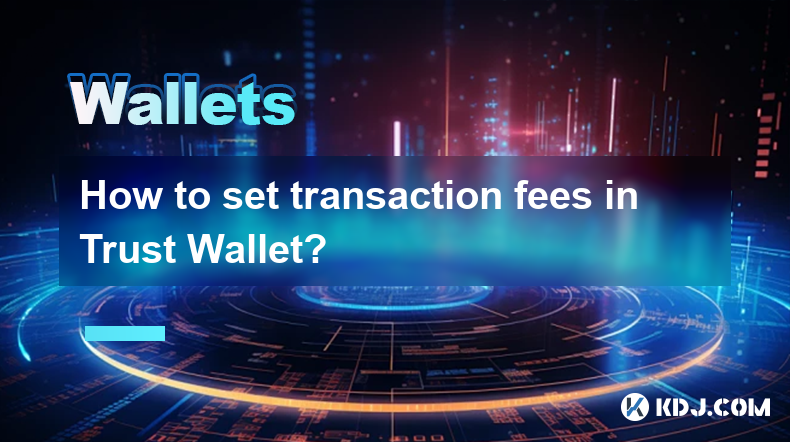
How to Set Transaction Fees in Trust Wallet
Trust Wallet, a popular mobile cryptocurrency wallet, allows users to manage their digital assets efficiently. However, understanding and setting transaction fees, or gas fees as they are often called, is crucial for successful transactions. This article will guide you through the process, explaining the nuances involved.
Understanding Transaction Fees in Trust Wallet
Transaction fees are essentially the cost of processing your cryptocurrency transaction on the blockchain network. These fees incentivize miners or validators to verify and add your transaction to the blockchain. The amount you pay depends on several factors, including the network congestion (how many transactions are currently being processed), the size of your transaction, and the speed at which you want your transaction to be confirmed. Higher fees generally lead to faster confirmation times. Understanding this is key to effectively managing your fees.
Setting Transaction Fees: A Step-by-Step Guide
Trust Wallet doesn't offer direct control over setting specific transaction fees in the same way some other wallets do. Instead, it provides options to adjust the speed of your transaction, which indirectly affects the fee. The wallet automatically estimates the appropriate fee based on network conditions. However, you can influence this estimate.
- Initiate a Transaction: Begin the process of sending your cryptocurrency. This usually involves selecting the recipient's address and the amount you wish to send.
- Review the Transaction Details: Before confirming, carefully review the transaction details. Trust Wallet will display an estimated fee. This fee is usually presented as a suggested "Fast," "Average," or "Slow" option.
- Choose Your Transaction Speed: Select the speed that suits your needs. "Fast" will generally result in the highest fee but the quickest confirmation. "Average" offers a balance between speed and cost, while "Slow" will be the cheapest but slowest. The exact fee associated with each option will be displayed.
- Confirm the Transaction: Once you've selected your preferred speed and reviewed all details, confirm the transaction. Trust Wallet will then broadcast your transaction to the relevant blockchain network.
Factors Affecting Transaction Fees
Several factors influence the transaction fees suggested by Trust Wallet. Understanding these helps you anticipate and potentially manage costs.
- Network Congestion: High network activity leads to higher fees. Times of increased trading volume often result in significantly higher fees as miners prioritize transactions with higher fees.
- Transaction Size: Larger transactions, such as those involving many inputs or outputs, generally incur higher fees.
- Cryptocurrency Type: Different cryptocurrencies operate on different blockchains with varying fee structures. Bitcoin transactions, for example, tend to have higher fees compared to some altcoins.
- Gas Price (for Ethereum-based tokens): Ethereum and its related tokens utilize gas as a unit of measurement for transaction fees. Higher gas prices lead to higher transaction costs. While Trust Wallet doesn't directly let you set gas prices, choosing a faster transaction speed will indirectly increase the gas used and thus the fee.
Advanced Considerations: Customizing Fees (Limited Options)
While Trust Wallet doesn't allow direct fee input, some advanced users might find ways to influence the fee indirectly. This often involves using a third-party tool to create a custom transaction with a specific fee and then importing that transaction into Trust Wallet for signing and broadcasting. This method is generally more complex and carries a higher risk of error, so it's only recommended for experienced users. Incorrectly formatted transactions could lead to loss of funds.
Troubleshooting Transaction Fees
Occasionally, you might encounter unexpected transaction fees or delays.
- High Fees: If you're seeing unexpectedly high fees, it's likely due to high network congestion. Try rescheduling your transaction for a less busy period.
- Transaction Failure: If your transaction fails, check the transaction details for any errors. It might be due to insufficient funds (including the fee) or an incorrect recipient address.
- Slow Confirmation: Slow confirmation times are usually due to the chosen transaction speed or high network congestion.
Frequently Asked Questions
Q: Can I completely avoid paying transaction fees in Trust Wallet?
A: No, transaction fees are inherent to blockchain networks. They are necessary to incentivize miners or validators to process transactions.
Q: What happens if I don't have enough funds to cover the transaction fee?
A: Your transaction will fail. Trust Wallet will usually display an error message indicating insufficient funds.
Q: Are transaction fees the same for all cryptocurrencies in Trust Wallet?
A: No, transaction fees vary significantly depending on the specific cryptocurrency and its underlying blockchain network.
Q: Can I change the transaction fee after I've initiated the transaction?
A: No, once you've initiated a transaction, you generally cannot change the fee. You would need to cancel the transaction and start over.
Q: Why are transaction fees sometimes higher than expected?
A: This is usually due to unexpected spikes in network congestion, which increases demand and thus the fees charged by miners.
Q: Does Trust Wallet show me the exact fee before I confirm the transaction?
A: Yes, Trust Wallet always displays an estimated transaction fee before you confirm, allowing you to review the cost before proceeding. The fee is usually presented in the cryptocurrency you're sending.
Q: What if I accidentally send a transaction with a much higher fee than intended?
A: Unfortunately, there's usually no way to recover the extra fee once the transaction is confirmed. Carefully reviewing the fee before confirmation is crucial.
Q: Can I choose a specific fee amount in Trust Wallet?
A: No, Trust Wallet doesn't directly allow you to input a custom fee amount. You select from pre-set speed options (Fast, Average, Slow) which indirectly determine the fee.
Q: Are there any hidden fees in Trust Wallet?
A: No, Trust Wallet is transparent about transaction fees. All fees are clearly displayed before you confirm your transaction. There are no hidden charges.
Disclaimer:info@kdj.com
The information provided is not trading advice. kdj.com does not assume any responsibility for any investments made based on the information provided in this article. Cryptocurrencies are highly volatile and it is highly recommended that you invest with caution after thorough research!
If you believe that the content used on this website infringes your copyright, please contact us immediately (info@kdj.com) and we will delete it promptly.
- Bearish Clouds Continue to Hover Over the Crypto Markets, BTC Drops Below $82K
- 2025-03-31 17:50:12
- With a Growing Community, Built-in AI Utility, and a Presale Heating Up Fast, It's Drawing Early Comparisons to SHIB's Legendary Rise
- 2025-03-31 17:50:12
- Updated Dogecoin (DOGE) Price Today – March 31, 2025
- 2025-03-31 17:45:12
- Pi Coin (Pi) Price Prediction Today (March 30): Targeting the $0.70–$0.72 Range
- 2025-03-31 17:45:12
- Elon Musk Brushes Aside Rumors Connecting US Government Efficiency Initiative to Dogecoin
- 2025-03-31 17:40:12
- A notable investor in the Pepe ($PEPE) coin has made a significant move, selling off a substantial portion of their holdings.
- 2025-03-31 17:40:12
Related knowledge

How to easily generate a Bitcoin payment address
Mar 29,2025 at 10:49am
Generating a Bitcoin payment address might seem daunting, but it's actually quite straightforward. This process is crucial for receiving Bitcoin, as each transaction requires a unique address. Understanding how this works is fundamental to using Bitcoin effectively. This guide will walk you through the simple steps, regardless of your technical experti...
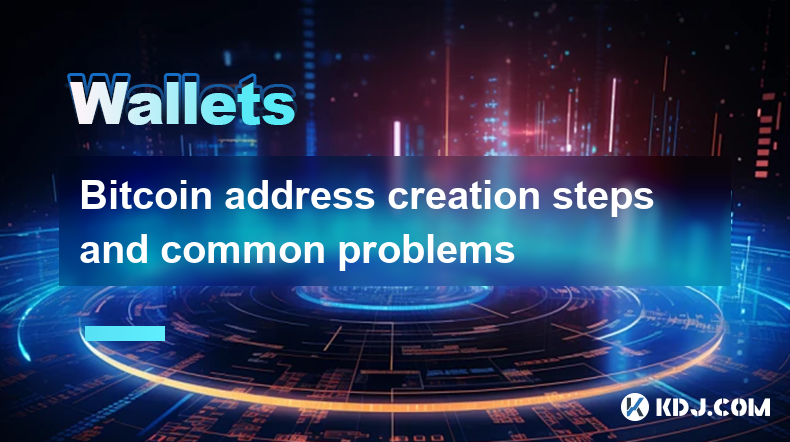
Bitcoin address creation steps and common problems
Mar 30,2025 at 06:07am
Understanding Bitcoin AddressesA Bitcoin address is a unique identifier, similar to a bank account number, used to receive Bitcoin. It's a string of alphanumeric characters generated from a public key, derived from your private key. Understanding the distinction between public and private keys is crucial for Bitcoin security. Your private key should be...
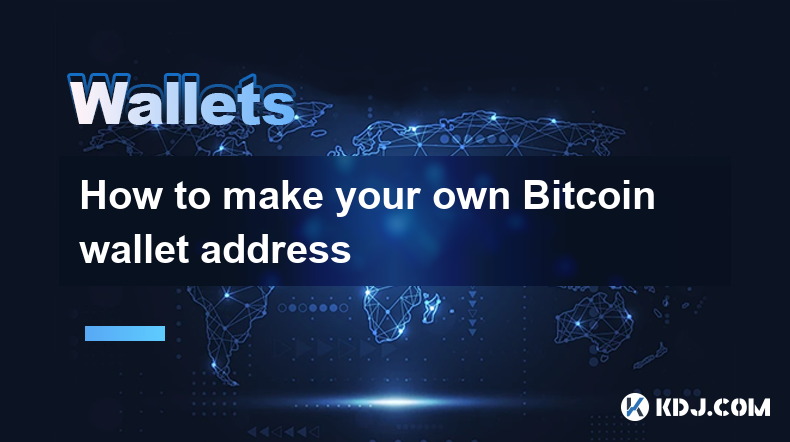
How to make your own Bitcoin wallet address
Mar 29,2025 at 08:42pm
Creating your own Bitcoin wallet address is crucial for securing and managing your Bitcoin holdings. It allows you to independently receive and send Bitcoin without relying on third-party services. This process involves understanding the different types of wallets and choosing the one that best suits your needs and technical expertise. Incorrectly gene...
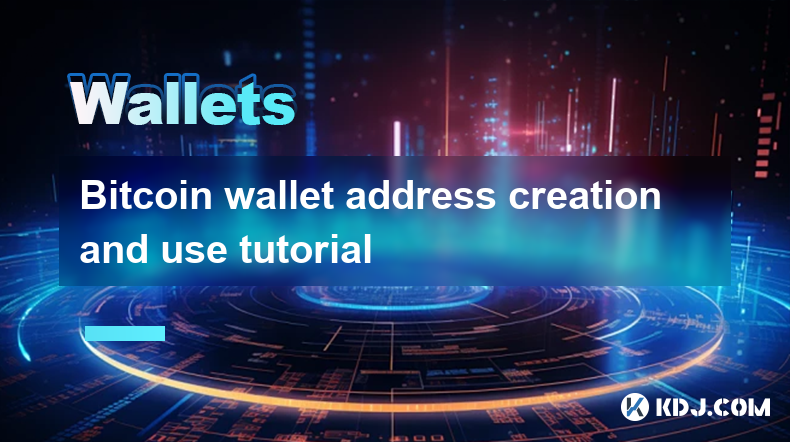
Bitcoin wallet address creation and use tutorial
Mar 29,2025 at 10:14pm
Understanding Bitcoin Wallet AddressesA Bitcoin wallet doesn't store Bitcoin in the way a traditional bank account does. Instead, it stores private keys, which are cryptographic secrets allowing you to access and spend your Bitcoin. Your Bitcoin address, on the other hand, is a public identifier, like an email address, that others can use to send you B...

Bitcoin address generation and secure storage guide
Mar 30,2025 at 08:07am
Understanding Bitcoin AddressesA Bitcoin address is essentially your public key, a string of alphanumeric characters used to receive Bitcoin. It's analogous to your bank account number. Unlike your private key, which is crucial for spending your Bitcoin, your address can be shared publicly without compromising your funds. Generating a new address is sim...
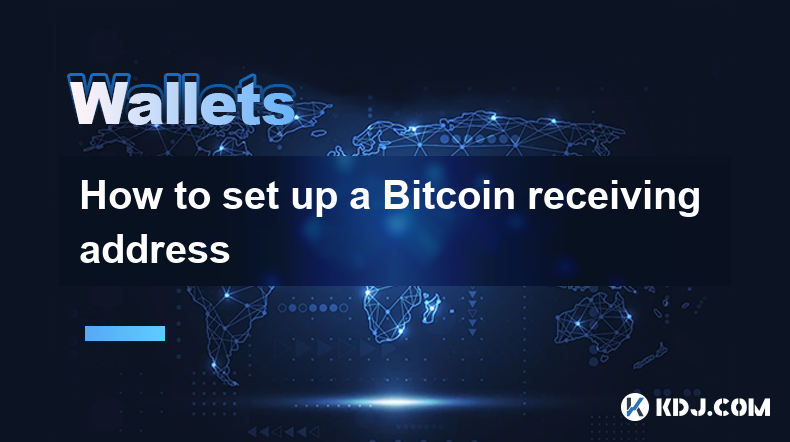
How to set up a Bitcoin receiving address
Mar 30,2025 at 06:14pm
Understanding Bitcoin Receiving AddressesA Bitcoin receiving address is essentially your unique identifier on the Bitcoin network. It's a string of alphanumeric characters that allows others to send Bitcoin to you. Think of it like your bank account number, but specifically for Bitcoin. You need a receiving address to receive Bitcoin. Crucially, you ca...

How to easily generate a Bitcoin payment address
Mar 29,2025 at 10:49am
Generating a Bitcoin payment address might seem daunting, but it's actually quite straightforward. This process is crucial for receiving Bitcoin, as each transaction requires a unique address. Understanding how this works is fundamental to using Bitcoin effectively. This guide will walk you through the simple steps, regardless of your technical experti...

Bitcoin address creation steps and common problems
Mar 30,2025 at 06:07am
Understanding Bitcoin AddressesA Bitcoin address is a unique identifier, similar to a bank account number, used to receive Bitcoin. It's a string of alphanumeric characters generated from a public key, derived from your private key. Understanding the distinction between public and private keys is crucial for Bitcoin security. Your private key should be...

How to make your own Bitcoin wallet address
Mar 29,2025 at 08:42pm
Creating your own Bitcoin wallet address is crucial for securing and managing your Bitcoin holdings. It allows you to independently receive and send Bitcoin without relying on third-party services. This process involves understanding the different types of wallets and choosing the one that best suits your needs and technical expertise. Incorrectly gene...

Bitcoin wallet address creation and use tutorial
Mar 29,2025 at 10:14pm
Understanding Bitcoin Wallet AddressesA Bitcoin wallet doesn't store Bitcoin in the way a traditional bank account does. Instead, it stores private keys, which are cryptographic secrets allowing you to access and spend your Bitcoin. Your Bitcoin address, on the other hand, is a public identifier, like an email address, that others can use to send you B...

Bitcoin address generation and secure storage guide
Mar 30,2025 at 08:07am
Understanding Bitcoin AddressesA Bitcoin address is essentially your public key, a string of alphanumeric characters used to receive Bitcoin. It's analogous to your bank account number. Unlike your private key, which is crucial for spending your Bitcoin, your address can be shared publicly without compromising your funds. Generating a new address is sim...

How to set up a Bitcoin receiving address
Mar 30,2025 at 06:14pm
Understanding Bitcoin Receiving AddressesA Bitcoin receiving address is essentially your unique identifier on the Bitcoin network. It's a string of alphanumeric characters that allows others to send Bitcoin to you. Think of it like your bank account number, but specifically for Bitcoin. You need a receiving address to receive Bitcoin. Crucially, you ca...
See all articles






















































































